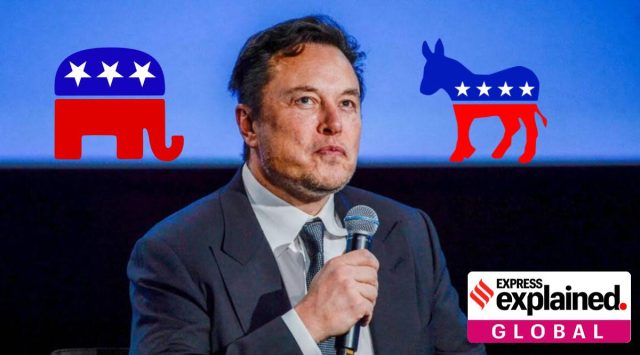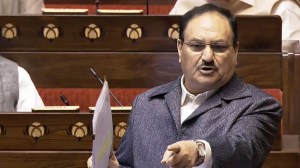Twitter owner and billionaire businessman Elon Musk has invited American TV journalists Rachel Maddow and Don Lemon — both considered liberal — to host their shows on his social media platform, soon after ex-Fox News star host Tucker Carlson — seen as a Conservative commentator — debuted his own new show on Twitter.
“It’d be great to have @maddow, @donlemon & others on the left put their shows on this platform. No exclusivity or legal docs required! You will receive our full support. The digital town square is for all,” he said in a tweet on June 9.

Three days before that, Musk hosted Robert F. Kennedy Jr, who is hoping for the Democratic presidential ticket in the 2024 Presidential Elections in America, on a Twitter Space (a function allowing live audio conservations). Earlier, on May 24, he had interviewed Florida governor and Republican politician Ron DeSantis, also on a Twitter Space, where the latter formally announced his bid for the 2024 US Presidential Elections.
Decoding Musk’s political affiliation has, therefore, become a matter of great interest for many.
Since Musk became the owner of Twitter in October 2022, with the stated aim of the platform allowing everyone to freely discuss ideas, his policies and politics have come under particular scrutiny. Even before his takeover, concerns over social media giants fuelling misinformation, fake news and biased information surrounded other tech CEOs.
What do we know of Musk’s politics so far?
Before taking over Twitter, Musk was known for being the co-founder of the fintech company Paypal, owner of the Electronic Vehicle (EV) car manufacturing company Tesla and the spacecraft manufacturing company SpaceX. He is also among the richest people in the world.
Story continues below this ad
In an interview with The New York Times in 2020, he described his politics as “middle-of-the-road.” “I’m socially very liberal. And then economically right of center, maybe, or center. I don’t know. I’m obviously not a communist,” he said.
For years, this was largely reflected in his public statements.
In September 2021, Texas Governor Greg Abbott said Musk liked the “social policies” of the state. Given the state’s historically conservative positions of prohibiting abortions and its loose gun-ownership regulations, Musk saw some criticism come his way.
Asked if he supported the laws in Texas, where Tesla is headquartered, Musk said: “In general, I believe the government should rarely impose its will upon the people, and, when doing so, should aspire to maximise their cumulative happiness,” he told CNBC. “That said, I would prefer to stay out of politics,” said Musk.
Story continues below this ad
Despite this statement, some of his views, particularly those on trade unions, fall into the conservative bracket in American politics.
In May 2018, on an organising attempt by workers in Fremont, California, he said: “Nothing stopping the Tesla team at our car plant from voting union … But why pay union dues & give up stock options for nothing?” In March this year, a US appeals court in Los Angeles said Musk had violated federal labour law by tweeting that employees would lose stock options if they joined a union.
Tesla currently does not have any workers’ unions across the US. Workers at a company factory in Buffalo, New York, who announced their intention to unionise in February this year, claimed that 30 of them were fired after they announced their bid to unionise.
At times, he has supported traditionally liberal ideas. In 2016, he suggested a universal basic income – the idea that everyone must be given a basic monthly sum by the government for survival – to protect people against the development of Artificial Intelligence (AI) and the resulting automation of jobs.
Story continues below this ad
Tesla has also championed clean and green energy. It has benefited from government subsidies and incentives like low-cost land for setting up factories, as per a Los Angeles Times Investigation, even though Musk himself has criticised subsidies. This is one among many contradictions in his apparent ideology.
Is Musk a Democrat or a Republican?
He has made his voting preferences clear – he said he voted for Democratic Presidential candidate Barack Obama in 2008 and then for Hilary Clinton and Joe Biden in 2016 and 2020, respectively. However, he has disagreed with Biden on multiple issues, saying his administration is not centrist enough.
In January 2021, when Biden spoke of other automobile companies manufacturing in the US, Musk took a swipe at his omission of Tesla. “Companies like GM and Ford are building more electric vehicles here at home than ever before,” Biden said in his speech.
Musk commented on the post, “Starts with a T, Ends with an A, ESL in the middle.” Later, responding to a user’s tweet criticising Biden, Musk tweeted, using a sock emoji: “Biden is a damp sock puppet in human form.”
On former President Donald Trump, he said in 2016: “I feel a bit stronger that he is probably not the right guy. He doesn’t seem to have the sort of character that reflects well on the United States.” However, he later reinstated Trump’s account – based on a Twitter poll – that was banned following his tweets during the January 6, 2021 US Capitol riots.
Story continues below this ad
After the former President’s indictment in a case involving his illegal possession of official documents on June 8 this year, Musk tweeted, “There does seem to be far higher interest in pursuing Trump compared to other people in politics. Very important that the justice system rebut what appears to be differential enforcement or they will lose public trust.”
According to the Federal Election Commission, which reports spending in federal races, he has donated almost a total of $1 million since 2003 to both parties, the New York Times reported.
Musk’s political views since owning Twitter
He began the process of purchasing Twitter for $44 billion in April 2022 and acquired it in October of that year, amid controversy over how he would pay for it. Soon after, he fired a significant number of employees, reportedly to turn Twitter into a profitable company.
In firing senior employees such as Vijaya Gadde, former head of Legal, Policy and Trust at Twitter, he teased revelations from the so-called ‘Twitter Files’. These leaked internal communications claimed that Twitter purposely censored news that criticised Democratic leaders.
Story continues below this ad
Over the years, Musk’s view of the Democratic Party has changed, with him saying in November 2022, “My preference for the 2024 presidency is someone sensible and centrist. I had hoped that would be the case for the Biden administration, but have been disappointed so far.”
More directly, before the 2022 midterm elections in December, he urged people to vote for Republicans: “Like most people in America, I agree with some of the Democrat and some of the Republican policies, but not all. However, if executive and legislative branches are dominated by *one* party, then we lose [the] balance of power,” he tweeted.
He termed the Democratic Party as “the party of division & hate” in May 2022 and incorrectly predicted a “massive” Republican wave in the midterms.
And so, even as he has stressed on a sense of neutrality for Twitter to maintain, many political commentators believe that lately, he has favoured right-wing or conservative points of view.
Story continues below this ad
This has been bolstered by his endorsement of Desantis on Twitter, as he replied “Yes” to a tweet asking him so in November 2022. He had added: “Twitter as a platform must be fair to all” despite his own views.
How has the American media analysed this shift?
Some commentators in the US argue that while Musk does not seem to have a strong political affiliation, he is now taking a conservative turn.
In an analysis from December 2022, The New York Times said: “Elon Musk, ever a bundle of contradictions and inconsistencies, has long made his politics tricky to pin down. To many of his critics, though, his relentless flurry of tweets in the six weeks since he took over Twitter has exposed his true conservative bent, and intensified their fears that he would make the social network more susceptible to right-wing misinformation.”
In another article titled “Musk drops the bipartisan pose — and Republicans cheer”, also from December 2022, Politico wrote: “The billionaire is the kind of tech gatekeeper Republicans have been looking for. As a self-proclaimed free speech absolutist, he’s relaxed or removed many of Twitter’s content moderation guardrails, actions conservatives have welcomed after years of chafing under what they alleged was censorship by the big platforms. And with each feud that Musk engineers — with liberal leaders, other tech companies, “cancel culture” — he draws himself closer to his new fans on the right.”
Story continues below this ad
According to a Pew Research Centre survey in May this year, the share of Republican and Republican-leaning Twitter users who say the platform is “mostly bad for American democracy” has dropped from 60% in 2021 to 21% today. Their attitudes, the study indicates, have become more favourable towards the site.
“Democrats’ views have moved in the opposite direction. The percentage of Democratic and Democratic-leaning Twitter users who say the platform is good for American democracy has decreased from 47% to 24%,” Pew reported. What such attitudes could mean for these groups’ usage of Twitter, with an election not too far away, will impact its goal of becoming a “public square”.








































